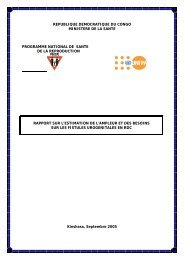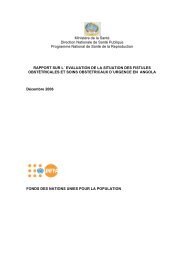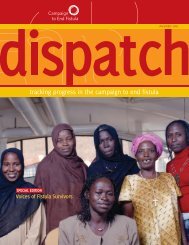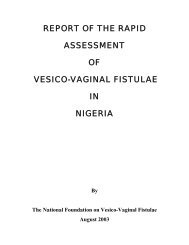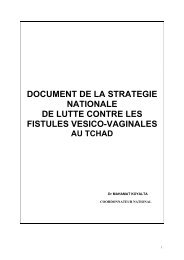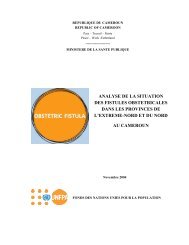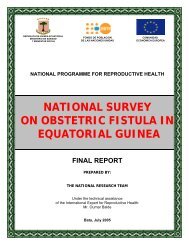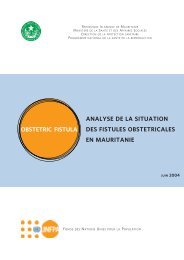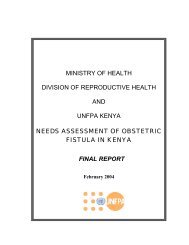Uganda - Campaign to End Fistula
Uganda - Campaign to End Fistula
Uganda - Campaign to End Fistula
- No tags were found...
You also want an ePaper? Increase the reach of your titles
YUMPU automatically turns print PDFs into web optimized ePapers that Google loves.
298.0 KEY INFORMANT INTERVIEWSAn in-depth interview was conducted among 24 persons who included the DistrictDirec<strong>to</strong>r of Health Services, the District Nursing Officer or District Public HealthNurse/Visi<strong>to</strong>r. These were selected because of their experience and work which requirethem <strong>to</strong> interact with grassroot people at rural health units and have access <strong>to</strong> all datacollected from the whole district. They are also involved in district planning andimplementing policy and projects in their district. The senior staff of the Ministry ofHealth headquarters and heads of development partners were similarly interviewed.8.1 Attitudes and beliefs of families and communitiesPregnancy and ChildbirthThis is a source of joy among stable couples or family but could be a source of miserywhen untimely like among the Bakiga “a curse <strong>to</strong> the girl if she conceived outsidemarriage”.A normal woman is expected <strong>to</strong> have a normal vaginal delivery and women who fail <strong>to</strong>conceive or deliver are inferior in society or have been bewitched. They will spend timeand money <strong>to</strong> get a child at any cost, as infertile women are denied family privileges.Operative Abdominal Delivery (Caesarian Section)Most women and communities are scared of abdominal operative delivery. It is neverwelcome and remains for weak women who cannot prove their womanhood. Everythingwill be done <strong>to</strong> avoid caesarian section and this would include going <strong>to</strong> hospital late wheneverything has failed. Many women believe if one goes early <strong>to</strong> hospital it can lead <strong>to</strong>her being operated early because “the health workers are impatient and do not wait forlong enough”. In Kabarole district among the Ba<strong>to</strong>oro, a woman in labour should bebrave and make no noise regardless of the severity of pain in order not <strong>to</strong> alarm people athome. She can be hidden in a banana plantation or bush <strong>to</strong> keep her away from people.Among the Banyankole if a mother is in labour in the hospital she must remain quie<strong>to</strong>therwise any “noise made during labour in a hospital alerts health workers <strong>to</strong> ‘cut’her”. Delivery is a private affair only close female relatives like her mother or motherin-laware supposed <strong>to</strong> be near and see her private parts unlike in hospital where privateparts are exposed for every one <strong>to</strong> see and later narrate s<strong>to</strong>ries.A lady from Kamwezi said that even if it meant “Kushatuka akahago” i.e. <strong>to</strong> rupture herbladder, she would never go <strong>to</strong> hospital <strong>to</strong> expose her private parts as health workerswould later talk about her natural ana<strong>to</strong>my of her genitalia.A few women deliver in health units in Mbarara district because they fear unnecessaryexposure of their private parts in hospital, a midwife at Kabuyanda said. Lying in supineposition during childbirth is not acceptable. They prefer <strong>to</strong> stand or squat while clothesare hanging and this reduces exposure of private parts as opposed <strong>to</strong> litho<strong>to</strong>my or supine positionsimposed in health units.



